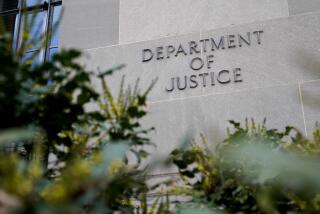U.S. Targets Fraud in Health Care : Crime: The Justice Department is doubling the number of FBI agents probing abuses. It is also forming prosecution units in 12 cities, including L.A.
- Share via
WASHINGTON — Estimating that health care fraud is costing billions of dollars and hitting those least able to protect themselves, the Justice Department is doubling the number of FBI agents investigating such crimes and setting up special prosecution units in 12 cities, including Los Angeles.
Department officials will tell Atty. Gen. William P. Barr in a report this week that health care fraud violations have grown from those committed by single practitioners to “organized criminal activity” affecting both government and private insurance programs.
The report, which Barr sought five weeks ago and which was described by department sources, says that the newly assigned FBI agents will use “special proactive projects,” presumably sting operations, “to put health care cheats in prison and forfeit their ill-gotten gains.”
Violations in the $738-billion industry range from false billings and diagnoses--sometimes involving patient complicity--to kickbacks, bribes and diversion of pharmaceutical drugs to illicit uses, the report says.
Quoting the FBI, the report outlines a “typical” Medicaid fraud and drug diversion scheme:
A doctor writes an unnecessary prescription, billing Medicaid for a patient’s visit and for unnecessary tests that the physician ordered. The patient then has the prescription filled at a pharmacy that is taking part in the fraud. The pharmacist bills Medicaid after filling the fraudulent prescription. The patient then sells the unneeded drug to a drug “diverter,” often using the money for his narcotics addiction. After the diverter repackages and sells the drug to a pharmacy, it re-enters the chain of retail sales.
Such a scheme subjects the Medicaid program to fraudulent costs and damages the drug distribution system while endangering consumers, according to the FBI. The actual source of the repackaged drug is disguised, making it impossible to trace in the event of a recall. In some cases, the drug has been adulterated or harmed through improper storage.
In the report, the FBI also describes a “typical” kickback scheme involving expensive medical equipment, such as breathing machines and nerve stimulators: A doctor prescribes the equipment for a patient who does not really need it, and Medicare or some other insurer pays for it. The maker or distributor of the equipment, once paid, kicks back a part of the illicit profit to the doctor.
The report was done by Ira Raphaelson, the Justice Department’s special counsel for financial institutions fraud who was recently named counselor to Barr.
While the report makes clear the burgeoning nature of the problem--the General Accounting Office estimates that health care fraud and abuse is costing taxpayers more than $50 billion annually--it is clear that budget pressures are preventing the Justice Department from mounting an all-out assault.
Although the FBI has found that fraud affecting health care costs is prevalent throughout the United States, the expanded FBI effort will concentrate on 12 cities where the problem is considered “most acute.” In addition to Los Angeles, they are Baltimore; Charlotte, N.C.; Chicago; Dallas; Detroit; Las Vegas; Miami; New York; Newark, N.J.; New Orleans, and Philadelphia.
Health care fraud units are being established in offices of U.S. attorneys in each of those cities, where about 100 assistant U.S. attorneys now work on criminal and civil matters. Ten more prosecutors have been assigned to help with the expanded program.
For fiscal 1993, which begins Oct. 1, the Administration is asking for 24 additional assistant U.S. attorneys to work on health care fraud.
In Washington, six attorneys have been assigned to a newly formed health care unit in the fraud section of the Justice Department’s criminal division to coordinate and support the initiative.
With 46 FBI agents already working on health care investigations, another 50 agents are being moved to such cases from counterespionage and counterterrorism assignments. The FBI previously had announced that 300 former counterintelligence agents were being shifted this year to violent crime assignments, reflecting an apparent reduction in the espionage threat, which had largely been linked to the spying activities of former Soviet Bloc countries.
For fiscal 1993, the Administration has told Congress that it will “reprogram” another 15 agents to investigate health care fraud and is seeking to add 35 new agents “to focus on more sophisticated criminal activity being committed by health care professionals, hospitals and durable medical equipment suppliers.”
In 1986, the department’s economic crime council designated health care fraud as one of its three top white-collar crime priorities, and its civil division has been using the federal False Claims Act to bring actions for excessive health care charges and other fraudulent practices.
During fiscal 1990 and 1991, the civil division recovered $24 million in health care fraud judgments and settlements, according to the report. Twenty-two of the division’s lawyers have been coordinating and bringing health care suits.
The department’s antitrust division currently is conducting more than 20 investigations of price fixing and other anti-competitive schemes that add to health care costs and reduce market competition and innovation, the report says.
More to Read
Sign up for Essential California
The most important California stories and recommendations in your inbox every morning.
You may occasionally receive promotional content from the Los Angeles Times.













